In today’s rapidly changing world, it is becoming increasingly clear that resilience and a growth mindset books for kids are crucial for children’s development. The ability to adapt, bounce back from challenges, and embrace opportunities for growth are not only valuable life skills but also fundamental to success in various aspects of life.
As parents, educators, and society as a whole, it is our responsibility to cultivate these qualities in children, empowering them to navigate the complexities of life with confidence and perseverance. It is important to recognize that resilience and a growth mindset books for kids are not innate traits but skills that can be nurtured and developed. Parents, educators, and mentors play a vital role in creating environments that promote these qualities.
By providing children with opportunities to face challenges, encouraging them to reflect on their experiences, and offering support and guidance along the way, we can foster resilience and a growth mindset in their hearts and minds.
Table of contents
- What is a Growth Mindset?
- Why Books Matter in Nurturing Resilience
- Book Recommendations
- Book 1: “Mindset: The New Psychology of Success” by Carol S. Dweck
- Book 2 – The Girl Who Never Made Mistakes (by Gary Rubinstein and Mark Pett)
- Book 3 – “Your Fantastic Elastic Brain” by Dr. JoAnn Deak
- Book 4: “The Empty Pot” by Demi
- Book 5: Frederick by Leo Lionni
- Book6: Giraffes Can’t Dance by G. Andrea and G. Parker-Rees
- Book7: After the Fall (How Humpty Dumpty Got Back Up Again) by Dan Santat
- Book8: The Most Magnificent Thing by Ashley Spires
- Book9: Mindset Matters (Without Limits) by Bryan Smith & Lisa Griffin
- Book10: Thanks for the Feedback, I Think (Best Me I Can Be!)By Julia Cook
- Book11: Nadia: The Girl Who Couldn’t Sit Still by Karlin Gray
- Additional Resources to Support Growth Mindset
- Conclusion
- Frequently Asked Questions
What is a Growth Mindset?
A growth mindset, as coined by psychologist Carol S. Dweck, is the belief that abilities and intelligence can be developed through dedication, effort, and perseverance. Unlike a fixed mindset, which assumes that intelligence and talents are fixed traits, a growth mindset nurtures the belief that skills and abilities can be improved with practice and learning.
Children with a growth mindset view challenges as opportunities for growth, setbacks as temporary obstacles, and the success of others as inspiration rather than a threat. They understand that their abilities are not predetermined, but rather shaped by their efforts and the strategies they employ.
By adopting a growth mindset, children learn to embrace the learning process, persist in the face of difficulties, and cultivate a love for lifelong learning.
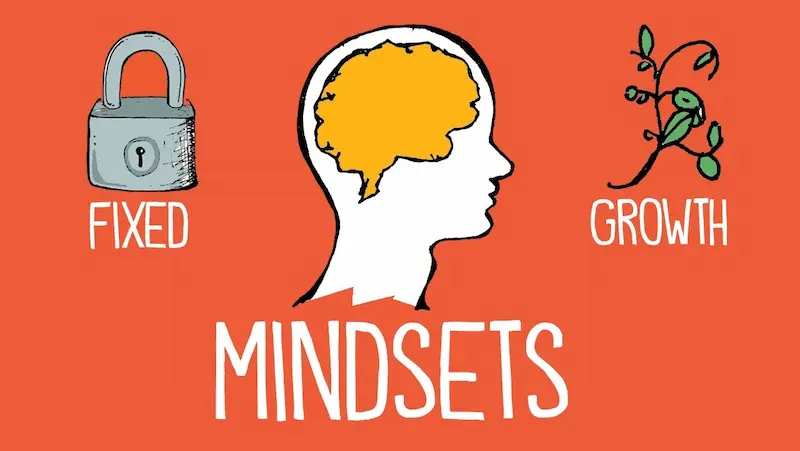
Benefits of a Growth Mindset Books for Kids
Resilience in the face of challenges: A growth mindset equips children with the resilience needed to overcome obstacles. Rather than being discouraged by failure, they see it as an opportunity to learn and improve. They are more likely to bounce back from setbacks, maintain a positive attitude, and persevere in pursuit of their goals.
Improved self-confidence: Children with a growth mindset develop a healthy sense of self-confidence. They understand that their abilities are not fixed, and with effort, they can improve their skills and achieve success. This belief in their own potential fosters a positive self-image, enhances self-esteem, and encourages them to take on new challenges with enthusiasm.
Effort becomes a pathway to success: In a growth mindset, the effort is celebrated and recognized as the key to progress. Children understand that hard work, practice, and dedication are essential for achieving their goals. They learn to embrace challenges, persist through difficulties, and develop effective strategies to enhance their abilities.
Embracing mistakes as learning opportunities: Children with a growth mindset view mistakes as valuable stepping stones on the path to mastery. They understand that making errors is a natural part of the learning process and an opportunity for growth. Instead of feeling defeated, they analyze their mistakes, learn from them, and make adjustments to improve their performance.
Cultivating a growth-oriented learning community: A growth mindset fosters a collaborative and supportive learning environment. Children who embrace this mindset are more likely to encourage and help their peers, as they understand that everyone can grow and succeed. They appreciate the diverse strengths and talents of others and see them as inspirations for their own growth.
Exploring mindfulness books for kids is a wonderful way to introduce them to the concept of staying present and managing their emotions. Similarly, nurturing a growth mindset in kids through books that highlight the power of effort, resilience, and embracing challenges can inspire them to develop a positive attitude towards learning and personal growth.
Why Books Matter in Nurturing Resilience
The act of reading and storytelling has a profound impact on shaping children’s mindsets and equipping them with the necessary skills to navigate adversity. In this blog, we will explore the reasons why books matter in nurturing resilience, focusing on the power of storytelling in shaping children’s mindsets and how books can inspire and teach resilience to young readers.

The Power of Storytelling in shaping children’s Mindset
Storytelling has been an integral part of human culture for centuries. It serves as a vehicle to pass down wisdom, morals, and life lessons from one generation to another. When children are exposed to stories through books, they embark on imaginative journeys that allow them to see the world from different perspectives. This process of immersion in narratives has a significant impact on their mindset, helping them develop resilience. Teaching kids’ responsibility can be enhanced through the power of storytelling. Sharing stories that highlight characters taking ownership of their actions and making responsible choices can help children understand the importance of accountability.
Identifying with characters: Books offer diverse characters with various backgrounds, personalities, and struggles. When children see characters who share similar experiences or face comparable challenges, they find a sense of validation and understanding. This identification allows children to perceive their own challenges as surmountable and encourages them to persevere.
Problem-solving skills: Stories often present characters with problems that require creative and critical thinking to solve. As children engage with these narratives, they learn to analyze situations, think outside the box, and develop problem-solving skills. These skills are crucial in building resilience, enabling children to find solutions and adapt to difficult circumstances.
How books can inspire and teach resilience to children
Books not only shape children’s mindsets through storytelling but also directly inspire and teach resilience. Here’s how:
Role models and inspiration: Many books feature resilient characters who face adversity head-on. These characters become role models for children, showcasing courage, perseverance, and determination. By observing the characters’ journey and their ability to bounce back from setbacks, children gain inspiration and learn valuable lessons about resilience.
Emotional intelligence: Books provide a safe space for children to explore and understand their emotions. Emotional intelligence is closely tied to resilience, as it involves recognizing, managing, and expressing emotions in a healthy way. Books that delve into characters’ emotions help children develop emotional intelligence, teaching them to cope with difficult emotions and develop resilience in the face of challenges.
Exploring storybooks for kids that focus on emotional intelligence is a fantastic way to help children develop a deeper understanding of their feelings and those of others.
Book Recommendations
In today’s fast-paced world, where challenges and setbacks are inevitable, developing resilience and a growth mindset is crucial. One powerful way to nurture these qualities is through reading books that inspire and offer valuable insights.
In this blog post, I will introduce you to a captivating book that delves into the themes of resilience and a growth mindset books for kids and provides recommendations on the appropriate age range for readers.
Book 1: “Mindset: The New Psychology of Success” by Carol S. Dweck
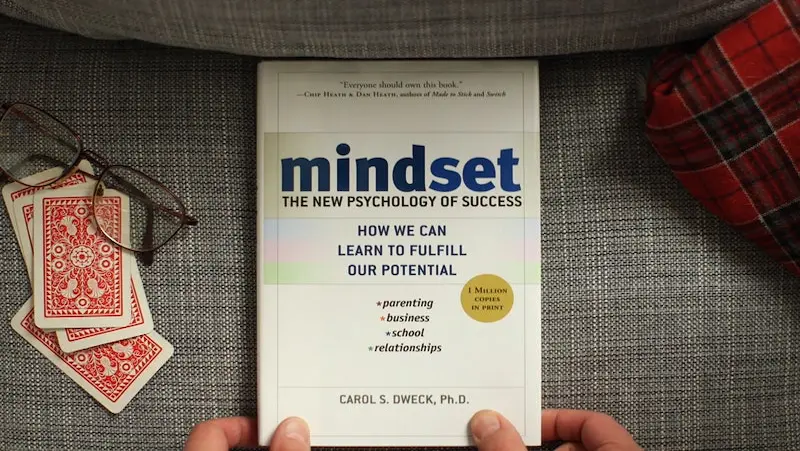
Summary of the Book
In “Mindset: The New Psychology of Success,” renowned psychologist Carol S. Dweck explores the concept of mindset and its profound impact on our achievements and personal development. Dweck proposes two main mindsets: the fixed mindset and the growth mindset. The fixed mindset is characterized by the belief that our intelligence and abilities are fixed traits, while the growth mindset embraces the idea that our talents can be developed through effort, learning, and resilience.
Key Lessons on Resilience and Growth Mindset
The power of mindset: Dweck’s book emphasizes that our mindset plays a fundamental role in shaping our attitudes, behaviors, and ultimately, our outcomes. By adopting a growth mindset, we can unlock our full potential and cultivate resilience in the face of obstacles.
Embracing challenges and failure: Dweck encourages readers to view challenges and setbacks as learning opportunities rather than indicators of inadequacy. By embracing these experiences and persisting through adversity, we can develop resilience and deepen our understanding of our own capabilities.
Recommended Age Range
“Mindset: The New Psychology of Success” is suitable for a wide range of readers. While the content can be beneficial for individuals of all ages, including adults, it is particularly valuable for teenagers and young adults who are navigating their educational and personal journeys. The concepts explored in the book can equip young readers with the tools to develop resilience, embrace challenges, and foster a growth mindset during crucial stages of their lives.
Book 2 – The Girl Who Never Made Mistakes (by Gary Rubinstein and Mark Pett)
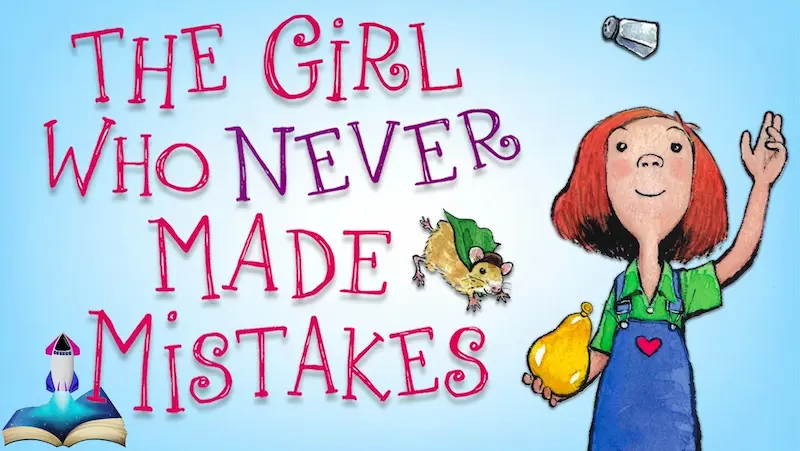
Summary of the Book
“The Girl Who Never Made Mistakes” centers around a young girl named [character’s name]. She is known throughout her town for never making a single mistake. From academic achievements to athletic prowess, she has always come out on top. However, as the story progresses, readers witness a pivotal moment that challenges her flawless reputation. Through a series of relatable and engaging events, the book showcases how [character’s name] navigates this new experience and learns the value of making mistakes.
Key Lessons on Resilience and Growth Mindset
Embracing Imperfection: The book emphasizes the importance of embracing imperfection. It encourages readers to understand that making mistakes is an inherent part of growth and development. By showcasing the journey of [character’s name], the story demonstrates that mistakes should not define one’s worth but should be seen as opportunities for learning and self-improvement.
Building Resilience: Resilience is a vital skill that enables individuals to bounce back from challenges and setbacks. The book shows how [character’s name] learns to develop resilience by facing and overcoming her fear of making mistakes. It encourages readers to view mistakes as opportunities to persevere, learn, and grow.
Self-Acceptance and Authenticity: Society often places undue pressure on individuals to meet unrealistic standards. “The Girl Who Never Made Mistakes” conveys the importance of being true to oneself. Through [character’s name]’s journey, readers learn that it’s okay to make mistakes and that authenticity and self-acceptance are more valuable than striving for perfection.
Recommended Age Range
“The Girl Who Never Made Mistakes” is a beautifully illustrated book suitable for children aged 4 to 8 years old. The engaging story and relatable characters make it an excellent choice for early readers, as well as a valuable addition to classroom libraries. However, the book’s underlying messages resonate with readers of all ages, making it an enjoyable and enlightening read for older children, teens, and even adults.
Book 3 – “Your Fantastic Elastic Brain” by Dr. JoAnn Deak
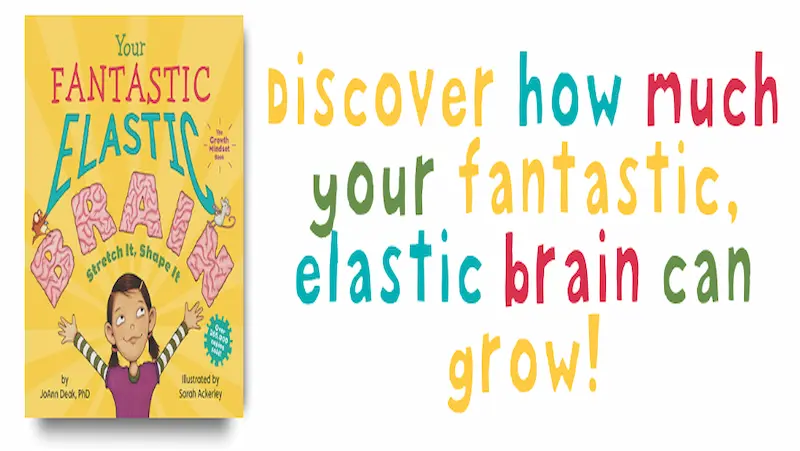
Summary of the Book
“Your Fantastic Elastic Brain” takes young readers on an exciting journey into the workings of the brain. Through vibrant illustrations and simple, accessible language, Dr. JoAnn Deak provides an engaging and age-appropriate introduction to neuroscience. The book explores the incredible capabilities of the brain, explaining how it grows and adapts through experience and challenges.
Throughout the pages, children are introduced to various brain functions, such as memory, creativity, problem-solving, and emotions. Dr. Deak emphasizes the brain’s plasticity, likening it to an elastic band that stretches and grows with effort and practice. The book encourages children to embrace challenges, make mistakes, and persevere, as these experiences help their brains develop and become even more amazing.
Key Lessons on Resilience and Growth Mindset:
The Power of a Growth Mindset: “Your Fantastic Elastic Brain” instills in young readers the concept of a growth mindset, emphasizing that intelligence and abilities can be developed through effort and practice. It encourages children to view challenges as opportunities for growth rather than as obstacles, fostering a resilient and determined attitude.
Neuroplasticity: Dr. Deak introduces the concept of neuroplasticity, explaining that the brain has the remarkable ability to change and grow throughout life. Children learn that by engaging in new experiences, practicing skills, and challenging themselves, they can strengthen their neural connections and expand their capabilities.
Persistence and Effort: The book highlights the significance of persistence and effort in achieving goals. It encourages children to persevere through challenges, showing them that hard work and determination can lead to success. By fostering a sense of agency and resilience, young readers are empowered to tackle obstacles with a positive attitude.
Recommended Age Range:
“Your Fantastic Elastic Brain” is ideally suited for children between the ages of 4 and 8. The book’s vibrant illustrations and accessible language make complex scientific concepts easily understandable for young readers. However, older children may also benefit from the book’s lessons on resilience and the brain’s capabilities.
Book 4: “The Empty Pot” by Demi
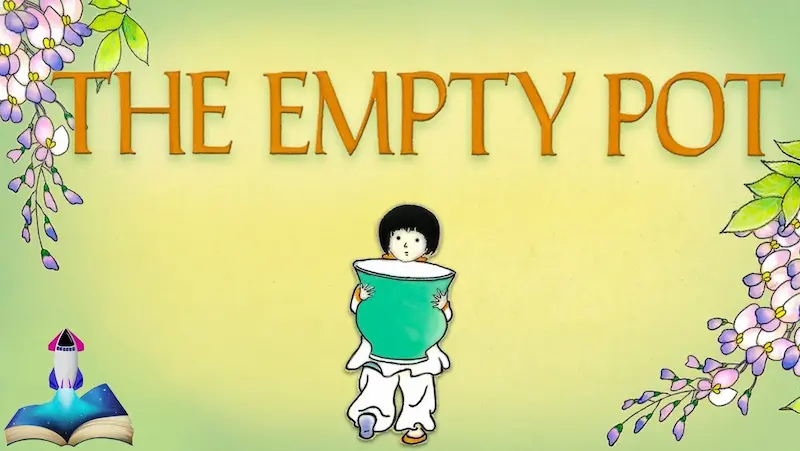
Summary of the Book
“The Empty Pot,” tells the story of a young boy named Ping, living in ancient China, who is faced with a unique challenge. The Emperor of China announces that he will choose his successor by giving each child in the kingdom a seed to grow and nurture. The child who presents the most beautiful plant within one year will become the next ruler.
Key Lessons on Resilience and Growth Mindset
“The Empty Pot” beautifully conveys essential lessons that resonate with readers of all ages. Here are some key takeaways:
Resilience in the Face of Failure: Ping’s unwavering determination and resilience in the face of adversity serve as an inspiring example. Even when his seed fails to grow, he refuses to give up, demonstrating the importance of perseverance and embracing setbacks as opportunities for growth.
Honesty and Integrity: The story emphasizes the importance of honesty and integrity. Despite the temptation to present a beautiful plant obtained through deception, Ping chooses to remain true to himself and presents his empty pot. This teaches young readers the value of honesty, even in challenging circumstances.
Recommended Age Range
“The Empty Pot” is a picture book that is suitable for children aged 4 to 8 years old. However, its timeless message and profound themes make it a compelling read for readers of all ages. It can be enjoyed as a captivating storytime experience for younger children and as a thought-provoking conversation starter for older readers.
Book 5: Frederick by Leo Lionni

Summary of the Book
“Frederick,” tells the story of a little field mouse named Frederick who lives with his fellow mice in a stone wall. As winter approaches, the other mice work diligently, gathering food and supplies to prepare for the long, cold season ahead. However, Frederick seems preoccupied and does not participate in these activities. Instead, he spends his time observing and collecting sun rays, colors, and words.
Key Lessons on Resilience and Growth Mindset
Embracing Uniqueness: Frederick teaches us the importance of embracing our individuality. While the other mice focus on practical tasks, Frederick finds his own way to contribute. He shows us that everyone has unique strengths and talents that can be valuable in their own way.
The Power of Perspective: Amidst challenging times, maintaining a positive perspective can make all the difference. Frederick’s ability to find beauty and inspiration in the world around him helps the mice endure the bleak winter. This reminds us that even in the darkest of times, a shift in perspective can bring light and hope.
Creativity and Imagination: Frederick demonstrates the power of creativity and imagination. By collecting sun rays, colors, and words, he taps into his creative spirit, enabling him to enrich the lives of others. This encourages readers to nurture their imagination and explore the endless possibilities it offers.
Resilience in Adversity: Frederick’s story highlights the importance of resilience in the face of adversity. Rather than succumbing to the challenges of winter, he chooses to uplift and inspire others. Through Frederick’s example, we learn the strength that lies within us to overcome difficulties and bring joy to those around us.
Recommended Age Range
“Frederick” by Leo Lionni is recommended for children aged 4 to 8 years old. However, the book’s timeless message and beautiful illustrations can be appreciated by readers of all ages. It serves as a gentle reminder to both young and old that resilience, creativity, and a growth mindset can help us navigate the ups and downs of life.
Book6: Giraffes Can’t Dance by G. Andrea and G. Parker-Rees
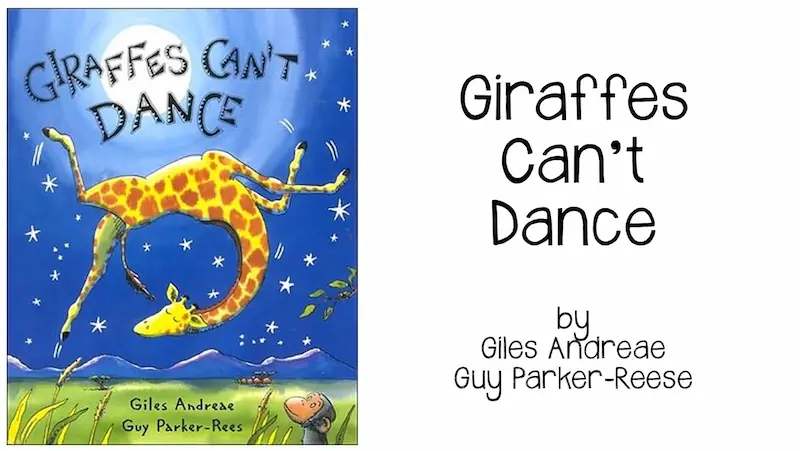
Summary of the Book
“Giraffes Can’t Dance” introduces us to Gerald, a giraffe who feels dejected and left out because he believes he cannot dance. Despite his best efforts, Gerald’s long neck and lanky legs cause him to trip and stumble on the dance floor, leading to ridicule and laughter from the other animals at the annual Jungle Dance.
Key Lessons on Resilience and Growth Mindset
Embrace Your Uniqueness: “Giraffes Can’t Dance” encourages readers to celebrate their individuality and embrace their unique qualities. Just like Gerald, we all have our strengths and weaknesses, and it’s important to appreciate and accept them. We should never let others define our abilities or limit us based on their preconceived notions.
Persistence and Resilience: Gerald’s determination to learn how to dance despite his initial struggles demonstrates the importance of perseverance. The book reminds us that setbacks are a natural part of the learning process, and with dedication and resilience, we can overcome obstacles and achieve our goals.
Recommended Age Range
“Giraffes Can’t Dance” is primarily targeted toward children aged 3 to 7 years old, but its delightful story and meaningful lessons resonate with readers of all ages. Younger children will appreciate the vibrant illustrations and simple narrative, while older readers can delve deeper into the themes of self-acceptance, resilience, and a growth mindset.
Book7: After the Fall (How Humpty Dumpty Got Back Up Again) by Dan Santat
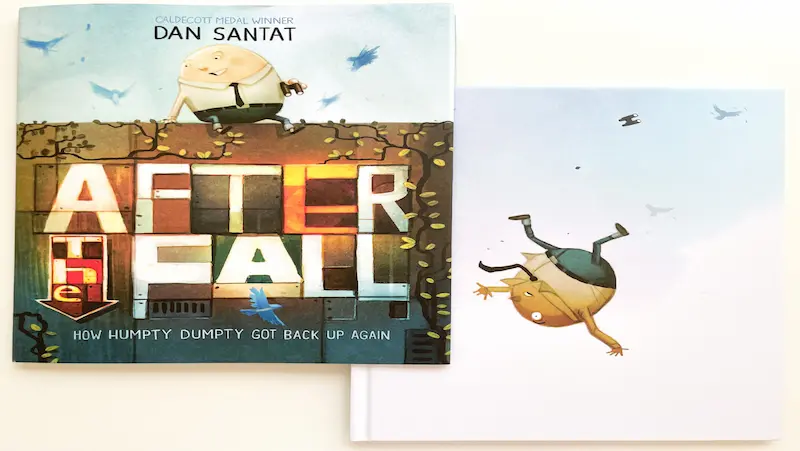
Summary of the Book
“After the Fall” is a modern-day sequel to the classic nursery rhyme, “Humpty Dumpty.” The story picks up after the infamous fall of Humpty Dumpty from the wall. Unlike the traditional tale, this book doesn’t stop at the tragic accident but focuses on Humpty Dumpty’s journey of overcoming fear and regaining his confidence.
Key Lessons on Resilience and Growth Mindset
Embracing Challenges: The story emphasizes the importance of embracing challenges rather than shying away from them. Humpty Dumpty faces his fear head-on, demonstrating that challenges can be opportunities for growth and self-discovery.
Perseverance: Humpty Dumpty’s journey highlights the significance of perseverance. Despite setbacks and moments of doubt, he persists in his quest to conquer his fear. This perseverance ultimately leads to personal growth and a newfound sense of empowerment.
Recommended Age Range
“After the Fall (How Humpty Dumpty Got Back Up Again)” is suitable for children aged 4 and above. The captivating illustrations, combined with the poignant storyline, make it an engaging read-aloud book for younger children. Older children can appreciate the deeper themes of resilience and growth mindset embedded within the narrative.
Book8: The Most Magnificent Thing by Ashley Spires
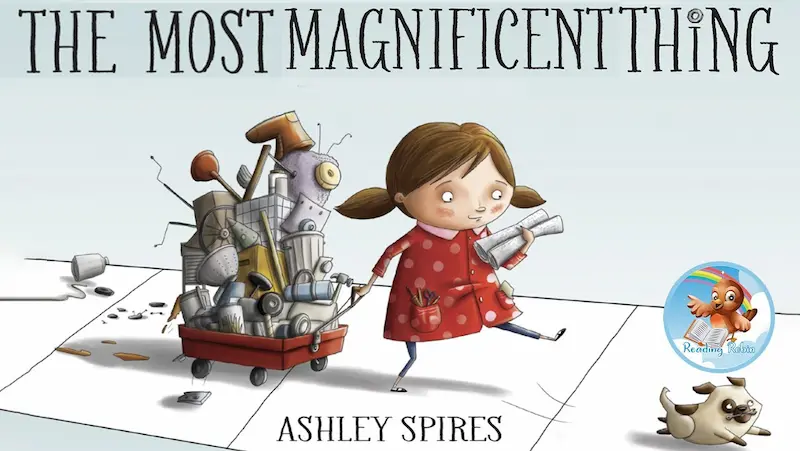
Summary of the Book
“The Most Magnificent Thing” revolves around a young girl and her faithful sidekick, her dog. The story follows their journey as they set out to create the “most magnificent thing” ever. Bursting with determination, the girl starts gathering various materials, making plans, and putting her heart and soul into her creation. However, things don’t go as planned, and frustration sets in. Despite numerous failed attempts, the girl refuses to give up. With her trusty dog by her side, she discovers the power of perseverance and the beauty of embracing failure as a stepping stone to success.
Key Lessons on Resilience and Growth Mindset
Perseverance in the Face of Challenges: “The Most Magnificent Thing” emphasizes the importance of persistence and resilience when faced with obstacles. The young girl encounters numerous setbacks and frustrations during her journey, but she doesn’t let them deter her. She demonstrates the power of determination by continuing to strive for her goal, even when things don’t go according to plan.
Recommended Age Range
“The Most Magnificent Thing” is best suited for children aged 4 to 8. The book’s simple yet engaging narrative, accompanied by vivid illustrations, captures the attention of young readers and sparks their imagination. The themes of resilience, growth mindset, and the value of teamwork are conveyed in a manner that is accessible and relatable to this age group.
Book9: Mindset Matters (Without Limits) by Bryan Smith & Lisa Griffin
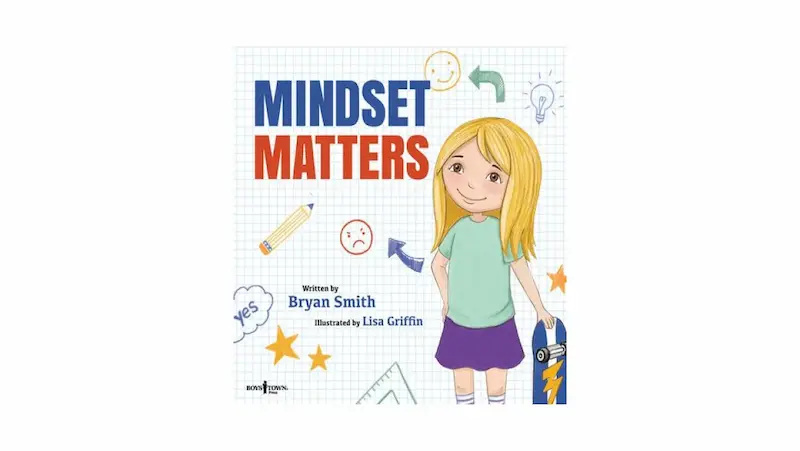
Summary of the Book
“Mindset Matters” takes readers on a transformative journey, uncovering the power of mindset in shaping our lives. Bryan Smith and Lisa Griffin emphasize that our mindset plays a pivotal role in determining our responses to challenges, setbacks, and opportunities. The book provides practical insights and strategies to cultivate a resilient and growth-oriented mindset.
With compelling real-life examples and engaging anecdotes, the authors illustrate how individuals can overcome limiting beliefs, develop a positive outlook, and harness their full potential.
Key Lessons on Resilience and Growth Mindset
Embrace Challenges and Failure: The book emphasizes the importance of viewing challenges and failures as opportunities for growth rather than obstacles to success. It explores how individuals with a growth mindset are more likely to embrace challenges, learn from their mistakes, and bounce back stronger. By reframing setbacks as learning experiences, readers can develop resilience and adaptability.
Recommended Age Range
While “Mindset Matters (Without Limits)” is suitable for readers of various ages, it is particularly beneficial for teenagers and young adults. Adolescence and early adulthood are critical stages for personal development and establishing a strong foundation for future success. By introducing the concepts of mindset, resilience, and growth early on, the book can equip young readers with the tools they need to navigate life’s challenges with confidence.
Book10: Thanks for the Feedback, I Think (Best Me I Can Be!)By Julia Cook
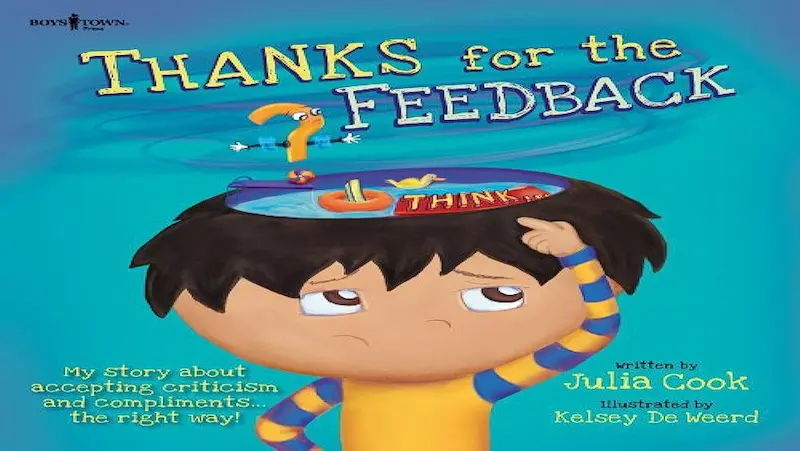
Summary of the Book
“Thanks for the Feedback, I Think” follows the story of RJ, a young boy who struggles with receiving feedback from others. RJ often finds feedback uncomfortable and takes it as a personal attack. However, when his teacher introduces the concept of feedback being an opportunity for growth, RJ begins to understand the value it holds. Through relatable situations and colorful illustrations, the book takes readers on RJ’s journey as he learns to accept feedback and embrace it as a tool for self-improvement.
Key Lessons on Resilience and Growth Mindset
One of the primary lessons conveyed in “Thanks for the Feedback, I Think” is the importance of resilience and a growth mindset. RJ initially perceives feedback as negative and becomes defensive. However, as the story progresses, he discovers that feedback is not meant to tear him down but rather to help him grow and improve.
The book emphasizes the idea that embracing feedback with an open mind can lead to personal development and success. It encourages children to view feedback as an opportunity to learn and become the best version of themselves.
Recommended Age Range
“Thanks for the Feedback, I Think” is ideally suited for children between the ages of 4 and 8 years old. This age range is perfect for introducing young readers to the concept of feedback and its role in personal growth. The book’s relatable characters, engaging storyline, and vibrant illustrations captivate young minds and make the learning experience enjoyable.
Book11: Nadia: The Girl Who Couldn’t Sit Still by Karlin Gray

Summary of the Book
“Nadia: The Girl Who Couldn’t Sit Still” beautifully illustrates the life and achievements of Nadia Comaneci, a Romanian gymnast who captured the world’s attention during the 1976 Olympics. Nadia’s story begins in a small town in Romania, where she discovers her passion for gymnastics at a young age. Despite facing numerous challenges, Nadia dedicates herself to her craft, working tirelessly to master the intricate routines and movements of the sport.
Key Lessons on Resilience and Growth Mindset
“Nadia: The Girl Who Couldn’t Sit Still” offers valuable lessons on resilience and a growth mindset that extend beyond the realm of sports. Nadia’s story serves as a powerful reminder that success is not achieved overnight but through relentless effort and perseverance. Despite facing setbacks and doubts, Nadia remains steadfast in her pursuit of excellence, overcoming obstacles with her unwavering determination and dedication.
The book highlights the importance of embracing challenges as opportunities for growth. Nadia’s willingness to push her limits and learn from failures showcases the power of a growth mindset. Readers are encouraged to adopt a similar approach in their own lives, embracing challenges as stepping stones towards personal development and achievement.
Recommended Age Range
“Nadia: The Girl Who Couldn’t Sit Still” is a picture book that can be enjoyed by readers of various ages. While the story’s simplicity and vibrant illustrations make it accessible to younger audiences, its underlying messages of resilience and growth mindset resonate with readers of all ages. Children aged 4 to 8 are particularly likely to connect with Nadia’s journey and draw inspiration from her remarkable achievements.
Additional Resources to Support Growth Mindset
Developing a growth mindset is essential for personal and professional growth. It is the belief that our abilities and intelligence can be developed through dedication, effort, and a willingness to learn. While cultivating a growth mindset is a lifelong journey, there are numerous resources available online that can support and enhance this mindset.
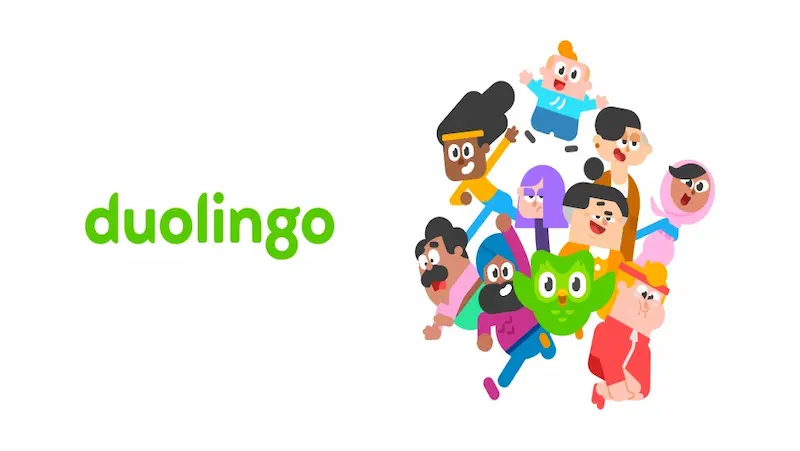
Mindset Works:
Mindset Works is a renowned website that provides an array of resources to develop and sustain a growth mindset. They offer comprehensive training programs, professional development resources, and an online course called “The Growth Mindset Online Summit.” Mindset Works also provides educators and parents with tools to nurture growth mindsets in children, including classroom activities and parenting tips.
Duolingo:
Learning a new language is an excellent way to cultivate a growth mindset. Duolingo is a popular language-learning app that offers free courses in multiple languages. By engaging in regular language practice, users develop discipline, perseverance, and an appreciation for the learning process.
TED Talks:
TED Talks have become a treasure trove of inspiration, motivation, and personal growth. With a wide range of topics, these short talks by experts and thought leaders can challenge your thinking, expand your horizons, and encourage a growth mindset. Some recommended TED Talks on this subject include Carol Dweck’s “The Power of Believing That You Can Improve,” Angela Duckworth’s “Grit: The Power of Passion and Perseverance,” and Eduardo Briceño’s “The Power of a Growth Mindset.”
Khan Academy:
Khan Academy is an educational platform that offers free online courses on various subjects, including maths, science, humanities, and test preparation. It promotes a growth mindset by providing learners with a supportive environment where they can learn at their own pace and receive personalized feedback.
Teaching kids about the difference between a growth mindset vs fixed mindset for kids is essential. A growth mindset emphasizes the belief that abilities and intelligence can be developed through effort, learning, and perseverance.
Conclusion
In today’s fast-paced and ever-evolving world, instilling a growth mindset in books for kids and financial education for kids in children has become more important than ever before. By cultivating a mindset that focuses on learning, resilience, and embracing challenges, children are empowered to reach their full potential and navigate the complexities of life with confidence.
In conclusion, growth mindset books for kids are a valuable resource for nurturing a positive and resilient mindset. These books offer stories that inspire, educate, and empower children to face challenges head-on, cultivate a love for learning, and understand the importance of effort and perseverance.
So, let us open the pages of these captivating books, embark on exciting journeys of self-discovery, and together, inspire a generation of young minds to embrace the power of growth and unlock their limitless potential.
BrightChamps page offers a wealth of informative articles and resources on various educational topics. From study tips and learning strategies to child development and parenting advice, the blog provides valuable insights to support both students and parents on their educational journey.
Frequently Asked Questions
A1. Resilience is the ability to bounce back from setbacks, adapt to challenges, and persevere in the face of adversity. It is important for children as it helps them develop coping skills, build confidence, and thrive in difficult situations.
A2. A growth mindset is a belief that abilities and intelligence can be developed through effort and practice. It contributes to resilience by encouraging children to embrace challenges, learn from failures, and persist in their efforts to improve.
A3. Reading books exposes children to different perspectives, characters facing challenges, and problem-solving strategies. It helps them develop empathy, critical thinking skills, and a broader understanding of the world, fostering resilience and a growth mindset.
A4. Growth mindset books for kids often feature relatable characters who encounter obstacles and demonstrate perseverance, resilience, and a positive attitude toward learning and growth. They emphasize the power of effort, embracing challenges, and learning from mistakes.
A5. Parents and caregivers can support children by engaging in discussions about the books they read, encouraging them to reflect on the characters’ experiences and challenges. They can also praise effort and perseverance rather than solely focusing on outcomes, fostering a growth mindset.
A6. Growth mindset books for kids can benefit children of all ages. However, younger children may benefit from simpler language and more visual storytelling, while older children can explore deeper themes and complex character development.
A7. Popular growth mindset books for kids for preschool-aged children include “The Little Engine That Could” by Watty Piper, “Giraffes Can’t Dance” by Giles Andreae, and “The Most Magnificent Thing” by Ashley Spires.
A8. Engaging growth mindset books for kids suitable for elementary school children include “Beautiful Oops!” by Barney Saltzberg, “Rosie Revere, Engineer” by Andrea Beaty, and “The Dot” by Peter H. Reynolds.
A9. Yes, there are growth mindset books for kids specifically designed for teenagers and adolescents. Some examples include “Mindset: The New Psychology of Success” by Carol S. Dweck and “Grit: The Power of Passion and Perseverance” by Angela Duckworth.
A10. Teachers can incorporate growth mindset books for kids into their curriculum by using them as read-aloud, discussing the characters’ challenges and growth, and connecting the themes to real-life situations. They can also encourage students to reflect on their own learning journeys and set goals based on a growth mindset.

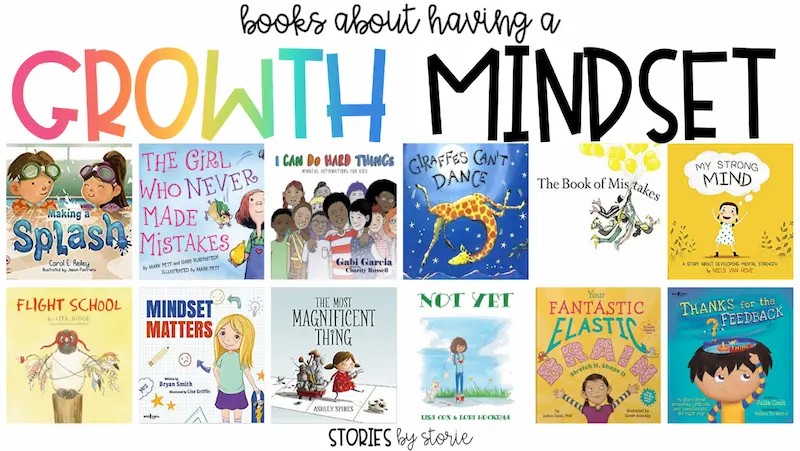
 We are an army of educators and passionate learners from BrightChamps family, committed to providing free learning resources to kids, parents & students.
We are an army of educators and passionate learners from BrightChamps family, committed to providing free learning resources to kids, parents & students.
















